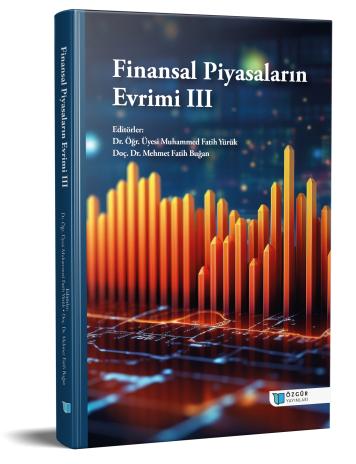
Yatırımcı Duyarlılığı ve CDS Primleri Arasındaki Simetrik ve Asimetrik Nedensellik İlişkisi: Türkiye Örneği
Şu kitabın bölümü:
Yürük,
M.
F.
&
Buğan,
M.
F.
(eds.)
2023.
Finansal Piyasaların Evrimi III.
Özet
Güven endeksleri ve Kredi Temerrüt Takası (CDS), yatırımcılar ve karar alıcılar açısından takip edilmekte ve öncü göstergeler olarak kabul edilmektedir. Bu çalışmada Türkiye’de 05/2012- 08/2023 dönemi için yatırımcı duyarlılığı göstergelerinden biri olarak kabul edilen güven endeksleri ile yabancıların ekonomiye olan güvenini temsil eden CDS primi arasındaki ilişkinin incelenmesi amaçlanmıştır. Çalışmada tüketici güven endeksi (TGE), ekonomi güven endeksi (EGE), reel kesim güven endeksi (RKGE), finansal hizmetler güven endeksi (FHGE) ve Türkiye'nin 5 yıllık kredi risk primi (CDS) değişkenleri kullanılmış ve durağanlık dereceleri için geleneksel birim kök testlerinin yanında Kalıntılarla Genişletilmiş En Küçük Kareler (RALS) Yöntemine Dayalı Birim Kök Testi de (RALS-ADF) kullanılmıştır. Nedensellik ilişkisi ise Hacker-Hatemi (2006) Simetrik Nedensellik ve ayrıca pozitif ve negatif şokları ayırt edebilen Hatemi-J (2012) Asimetrik Nedensellik analizleri ile test edilmiştir. Hacker-Hatemi (2006) simetrik nedensellik testi sonuçlarında TGE ve CDS primi arasında çift yönlü nedensellik, CDS primlerinden RKGE ve EGE’ne doğru tek yönlü bir nedensellik ilişkisi tespit edilmiştir. Hatemi-J (2012) asimetrik nedensellik testi sonuçlarında ise; TGE ve RKGE’nin negatif şoklarından CDS priminin pozitif şoklarına, RKGE ve EGE’nin pozitif şoklarından CDS priminin negatif şoklarına, CDS priminin pozitif şoklarından, FHGE, RKGE ve EGE’nin negatif şoklarına doğru da beklenen ve istatistiksel olarak anlamlı sonuçlara ulaşılmıştır. Bu sonuçlar, genel olarak bakıldığında Türkiye’deki tüketiciler, finansal kuruluş yöneticilerinin ve özellikle de üreticilerin ekonomiye olan güven göstergeleri ile yabancıların Türkiye ekonomisine olan güven göstergelerinin birbirlerini etkilediği söylenebilir.

